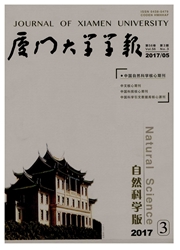

 中文摘要:
中文摘要:
酪氨酸酶是生物体合成黑色素的关键酶.研究了茴香醛和茴香酸对蘑菇酪氨酸酶单酚酶活力的影响和抑制作用.结果表明:茴香醛对蘑菇酪氨酸酶单酚酶活力的影响表现为对酶稳态活力的抑制作用,茴香酸除了影响酶稳态活力外对迟滞时间还有延长作用.3.0mmol/L的茴香醛使得单酚酶的稳态酶活力下降70.5%。对迟滞时间几乎没有影响;相比之下.3.0mmol/L的茴香酸可以使单酚酶活力下降38.8%,并使迟滞时间从114s延长到218s.通过研究茴香醛和茴香酸对蘑菇酪氨酸酶的抑制作用机理,为进一步研究设计新型酪氨酸酶抑制剂奠定基础.
 英文摘要:
英文摘要:
Tyrosinase (1.14.18.1), widely distributing in nature,can catalyze both the hydroxylation of monophenols to o-diphenols and the oxidation of o-diphenols to o-quinones, being the key enzyme of melanin biosynthesis. In the present paper, inhibitory effect of anisaldehyde and anisic acid on mushroom tyrosinase was studied. The results showed that anisaldehyde and anisic acid could both inhibit the monophenolase and o-diphenolase activity of mushroom tyrosinase. The inhibition kinetics and mechanism of the enzyme by them were studied. The results showed that anisaldehyde just inhibitied steady-state activity of the monophenolase, anisic acid not only inhibited steady-state activity of the monophenolase, but also prolonged the lag time of the enzyme. 3.0 mmol/L anisaldehyde made tyrosinase lose its 70.5 % monophenolase activity. The same concentration anisic acid made tyrosinase lose its 38.8% monophenolase activity,by the way, the lag time of the enyme prolonged from 114 s to 218 s. So they may have the bright prospect in the cosmetic and antioxidant.
 同期刊论文项目
同期刊论文项目
 同项目期刊论文
同项目期刊论文
 Inhibitory kinetics of p-substituted benzaldehydes on polyphenol oxidase from the Fifth instar of Pi
Inhibitory kinetics of p-substituted benzaldehydes on polyphenol oxidase from the Fifth instar of Pi Inhibitory effects of substrate analogs on enzyme activity and substrate specificities of mushroom t
Inhibitory effects of substrate analogs on enzyme activity and substrate specificities of mushroom t Inhibitory effects of 4-chlorosalicylic acid on mushroom tyrosinase and its antimicrobial activities
Inhibitory effects of 4-chlorosalicylic acid on mushroom tyrosinase and its antimicrobial activities Inhibitory effects of phloridzin dihydrate on the activity of mushroom (Agaricus bisporus) tyrosinas
Inhibitory effects of phloridzin dihydrate on the activity of mushroom (Agaricus bisporus) tyrosinas Inhibitory effects of methyl trans-cinnamate on mushroom tyrosinase and its antimicrobial activities
Inhibitory effects of methyl trans-cinnamate on mushroom tyrosinase and its antimicrobial activities Activation kinetics of cetylpyridinium chloride on the prophenol oxidase from pupae of blowfly (Sarc
Activation kinetics of cetylpyridinium chloride on the prophenol oxidase from pupae of blowfly (Sarc Inhibitory effects of cis- and trans- isomers of 3,5-dihydroxystilbene on the activity of mushroom t
Inhibitory effects of cis- and trans- isomers of 3,5-dihydroxystilbene on the activity of mushroom t 期刊信息
期刊信息
